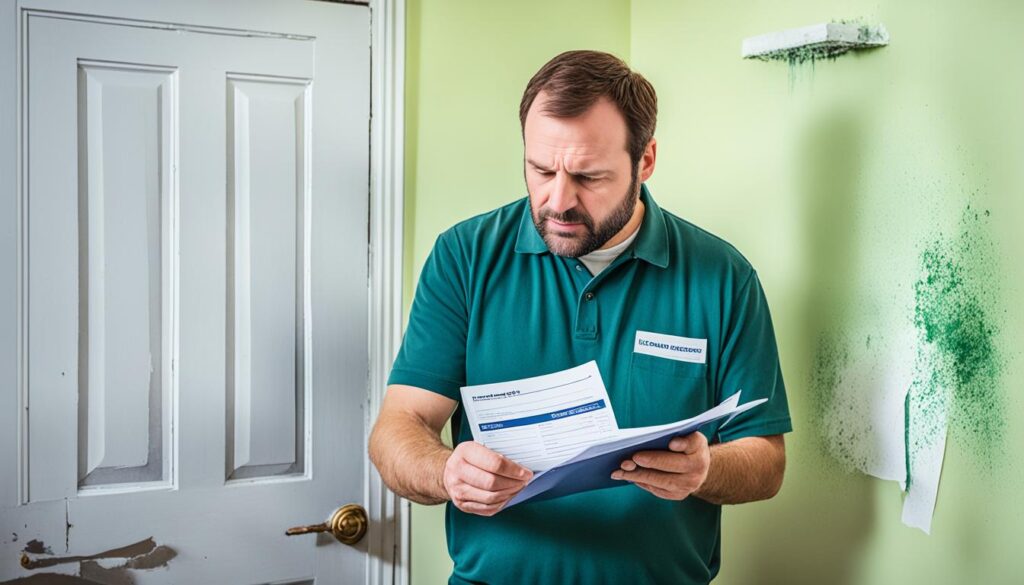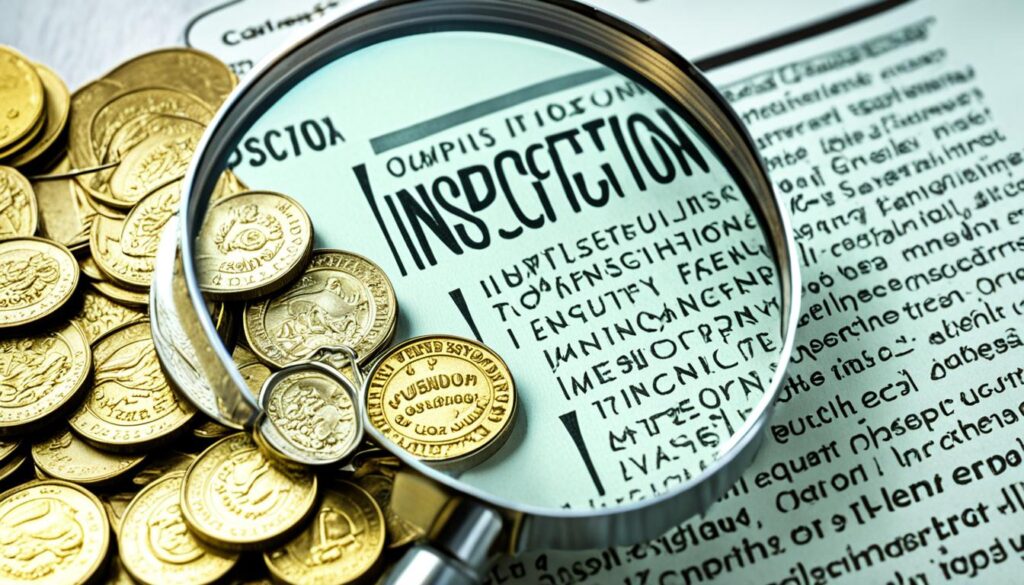
Charging Landlords for Mold Inspections & Fees
As a tenant, it is essential to understand your rights and responsibilities when it comes to mold issues in your rental property. One question that often arises is, “Can I charge my landlord for third-party inspections and mold-related expenses?” In this section, we will delve into the legalities surrounding this matter, explore landlord responsibilities, tenant rights, and the cost of mold inspections.
Key Takeaways:
- Tenants may wonder if they can charge their landlord for third-party mold inspections and fees.
- Landlords have legal obligations to maintain rental properties and provide a safe living environment for tenants.
- Tenant rights include the expectation of proper maintenance and prompt resolution of mold issues by the landlord.
- Third-party mold inspections are crucial in identifying and addressing mold problems effectively.
- The cost of mold inspections varies but is an important investment in ensuring the health and safety of tenants.
Understanding Landlord Obligations and Tenant Rights
When renting a property, it’s important for tenants to have a clear understanding of their rights and the legal obligations that landlords have. This section will explore the various responsibilities that landlords have when it comes to rental property maintenance, as well as the rights that tenants possess to ensure a safe and healthy living environment.
Landlord Duties
Landlords have certain obligations that they must fulfill to maintain their rental properties properly. These duties not only contribute to the overall safety and well-being of tenants but also play a crucial role in preventing mold issues.
- Repair and Maintenance: Landlords are responsible for ensuring that the property is in good repair and free from hazards. This includes addressing any necessary repairs, such as fixing leaky pipes or addressing water damage, to prevent the growth of mold.
- Providing Adequate Ventilation: Landlords must ensure that rental units have sufficient ventilation to minimize moisture buildup, which can lead to mold growth. This includes installing and maintaining proper ventilation systems in kitchens, bathrooms, and other areas prone to humidity.
- Maintaining Plumbing and Drainage: Landlords should ensure that plumbing and drainage systems are in good working order to prevent water leaks and moisture issues that can contribute to mold growth.
- Conducting Regular Inspections: Landlords should conduct regular inspections of their rental properties to identify any potential maintenance issues, including signs of mold growth. Prompt identification and remediation can help prevent widespread mold problems.
Tenant Rights
Tenants also have specific rights when it comes to rental property maintenance and mold prevention. Understanding these rights is essential for tenants to assert their needs and address any potential issues.
- Right to a Safe Living Environment: Tenants have the right to live in a safe and habitable environment. This includes having a rental property that is free from mold and other health hazards.
- Right to Request Repairs: If tenants notice any maintenance issues, including potential mold growth, they have the right to notify their landlords and request repairs. Landlords should address these requests promptly to prevent further damage and potential health risks.
- Right to Withhold Rent: In certain situations where landlords fail to address significant repair issues, tenants may have the right to withhold rent until the repairs are made. However, it’s crucial for tenants to familiarize themselves with local laws and regulations regarding this right.
- Right to Break Lease: If mold issues pose a significant health risk and landlords fail to address them, tenants may have the right to break their lease without penalty. Again, it’s essential to consult local laws and regulations to understand the specific circumstances under which this right applies.
By understanding both landlord obligations and tenant rights, it becomes easier for both parties to communicate effectively and address any maintenance issues, including mold growth. Open and transparent communication is key to maintaining a healthy and harmonious landlord-tenant relationship.

| Landlord Obligations | Tenant Rights |
|---|---|
| Repair and Maintenance | Right to a Safe Living Environment |
| Providing Adequate Ventilation | Right to Request Repairs |
| Maintaining Plumbing and Drainage | Right to Withhold Rent |
| Conducting Regular Inspections | Right to Break Lease |
Mold Inspections and the Role of Third-Party Assessments
In order to effectively identify and address mold issues, mold inspections play a crucial role. However, when it comes to evaluating the presence of mold and determining the extent of remediation required, independent third-party assessments are highly recommended. These assessments provide unbiased and objective evaluations, ensuring accurate results and informed decision-making.
The mold remediation process requires a thorough understanding of the mold problem, its causes, and the necessary steps to effectively resolve it. This is where third-party inspections come into play. They provide valuable insights into the presence of mold, its potential hazards, and the appropriate remediation techniques to be employed.
The Importance of Independent Inspections
Independent mold inspections are conducted by professionals who have no affiliation with the property owner or the tenant. This impartiality ensures that the assessment is unbiased and objective, providing reliable information on the mold situation. It also eliminates any potential conflict of interest and ensures that the inspection is conducted according to industry standards.
During a third-party inspection, the inspector thoroughly examines the property for signs of mold growth, evaluates the extent of contamination, and identifies the underlying causes. They may also collect samples for laboratory testing to accurately determine the type and concentration of mold present.
“Independent mold inspections are crucial in ensuring an unbiased evaluation of the mold situation and determining the appropriate remediation measures.”
By conducting independent inspections, property owners and tenants can have confidence in the accuracy of the findings. This allows for informed decision-making regarding necessary remediation efforts, ensuring the safety and well-being of all occupants.
The Average Cost of Mold Inspections
The cost of mold inspections can vary depending on various factors such as the size of the property, the extent of mold growth, and the location. On average, mold inspections can range from $300 to $600. It is important to note that this cost is for the inspection alone and does not include any remediation or mitigation efforts that may be required.
While the cost of mold inspections may seem significant, it is a worthwhile investment in identifying and addressing potential mold issues promptly. Early detection can help prevent further spreading of mold and minimize the overall cost of remediation.
Ultimately, the cost of mold inspections should be viewed as a necessary step towards ensuring the health and safety of the occupants, as well as protecting the property from further damage.

Overall, third-party mold inspections play a crucial role in accurately assessing mold issues and guiding the mold remediation process. Their independent nature ensures unbiased evaluations, and while the cost of inspections may vary, it is a worthwhile investment in maintaining a safe and mold-free environment.
Conclusion
Throughout this article, we have delved into the topic of charging landlords for third-party mold inspections and fees. We have explored the legal obligations that landlords have when it comes to providing a safe and healthy living environment for their tenants. Additionally, we have highlighted the rights that tenants possess in terms of proper maintenance and addressing mold issues.
One of the crucial aspects we discussed is the role of third-party assessments in addressing mold problems. These independent inspections play a vital part in identifying and resolving mold issues effectively. While the cost of mold inspections may vary depending on various factors, it is important for tenants to understand their rights and options related to inspections and mold remediation.
In conclusion, tenants should be aware that their ability to charge their landlord for third-party inspections and mold expenses can vary depending on local laws and individual circumstances. It is recommended for tenants to consult with legal professionals or tenancy organizations to understand their specific rights and responsibilities. By staying informed and proactive, tenants can ensure a safe and healthy living environment.




